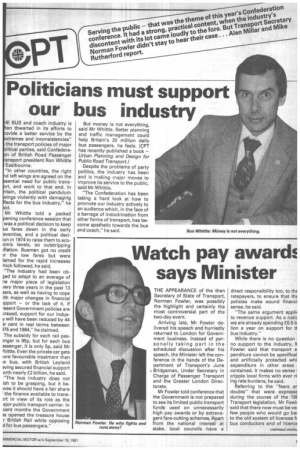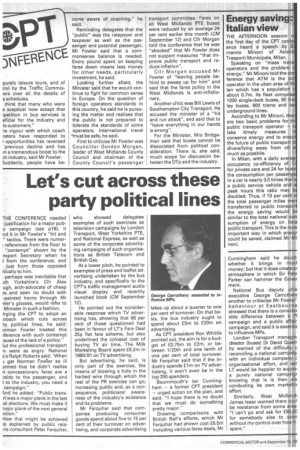Watch pay award:, says Minister
Page 17

Page 18

If you've noticed an error in this article please click here to report it so we can fix it.
THE APPEARANCE of the then Secretary of State of Transport, Norman Fowler, was possibly the highlight and certainly the most controversial part of the two-day event.
Arriving late, Mr Fowler delivered his speech and hurriedly returned to London for Government business. Instead of personally taking part in the scheduled discussion after his speech, the Minister left the conference in the hands of the Department of Transport's June Bridgeman, Under Secretary in Charge of Passenger Transport and the Greater London Directorate.
Mr Fowler told conference that the Government is not prepared to see its limited public transport funds used on unnecessarily high pay awards or by extravagent fare-cutting schemes. Apart Norman Fowler. He who fights and from the national interest at runs away? stake local councils have a
direct responsibility too, to thE ratepayers, to ensure that thE policies make sound financi sense, he said.
"The same argument applii to revenue support. As a natic we are already spending £0.5 b lion a year on support for ti bus industry."
While there is no question no support to the industry, I\ Fowler said that transport e penditure cannot be specifical and artificially protected whi expenditure in other areas contained. It makes no sense I cripple local firms with ever ri ing rate burdens, he said.
Referring to the "fears ar doubts" that were expressE during the course of the 19f Transport legislation, Mr Fowl' said that there now must be vei few people who would go bat to the old system of licences ft bus conductors and of licencE purely leisure tours, and of trol by the Traffic Commisiers over all the details of s schedules.
think that many who were e sceptical now accept that 'petition in bus services is eficial for the industry and ts customers."
le vigour with which coach rators have responded to opportunities has reversed previous decline and has rn a tremendous boost to the oh industry, said Mr Fowler. Suddenly, people have be come aware of coaching," he said.
Reminding delegates that the "public" was the ratepayer and taxpayer as well as the passenger and potential passenger, Mr Fowler said that a cornmonsense balance is needed. Every pound spent on keeping fares down means less money for other needs, particularly investment, he said.
Looking further afield, the Minister said that he would continue to fight for common sense in Europe. On the question of foreign operators standards in this country, he said he is pursuing the matter and realises that the public is not prepared to tolerate the standards of some operators. International travel 'must be safe, he said.
First to criticise Mr Fowler was Councillor Gordon Morgan, leader of West Midlands County Council and chairman of the County Council's passenger
transport committee. Fares on all West Midlands PTE buses were reduced by an average 24 per cent earlier this month (CM September 12) and CIIr Morgan told the conference that he was "shocked" that Mr Fowler .does not support measures "that improve public transport and reduce inflation".
ClIr Morgan accused Mr Fowler of "leaving people behind to sweep up for him" and said that the fares policy in the West Midlands is anti-inflationary.
Another eritic was Bill Lewis of Southampton City Transport. He accused the minister of a "hit and run attack", and said that to "leave everything in our hands is wrong".
For the Minister, Mrs Bridgeman said that buses cannot be dissociated from political consideration. There is, she said, much scope for discussion between the DTp and the industry.








































































